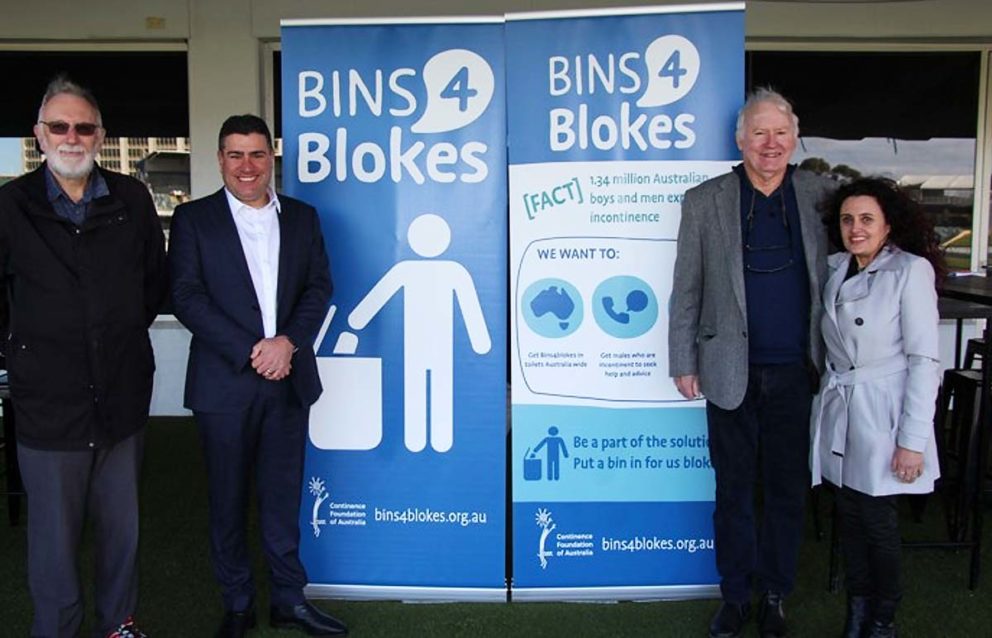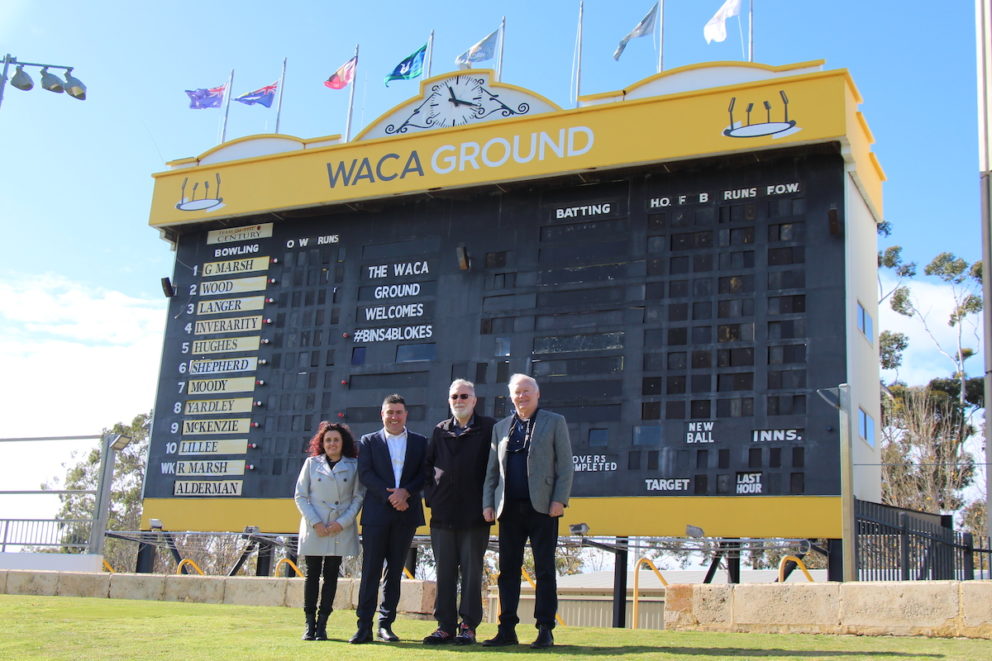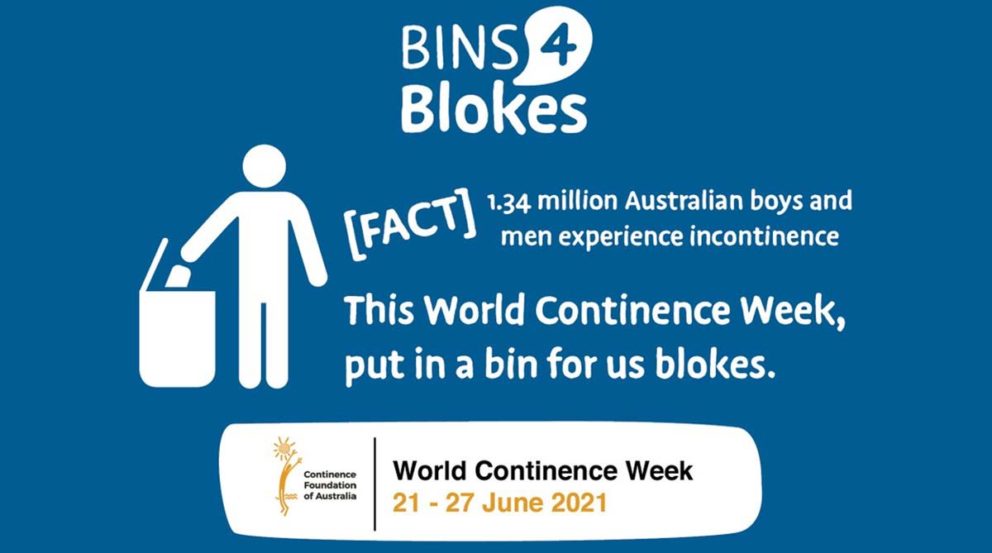Campaigning for hygiene bins for men in public toilets throughout Australia
 When a patient opened up about the challenges of living with incontinence, Men’s Health Physiotherapist, Dr Jo Milios, knew something had to be done. Having had the opportunity to work with thousands of men undergoing treatment for prostate cancer and dealing with incontinence issues following surgery or radiation therapies, Jo was very aware of the lack of hygiene facilities for men in public toilets. When Lina Scaffidi opened up about her husband’s difficulties in disposing of continence pads, Jo knew that Mr Scaffidi was not alone.
When a patient opened up about the challenges of living with incontinence, Men’s Health Physiotherapist, Dr Jo Milios, knew something had to be done. Having had the opportunity to work with thousands of men undergoing treatment for prostate cancer and dealing with incontinence issues following surgery or radiation therapies, Jo was very aware of the lack of hygiene facilities for men in public toilets. When Lina Scaffidi opened up about her husband’s difficulties in disposing of continence pads, Jo knew that Mr Scaffidi was not alone.
Approximately 1.34 million boys and men in Australia live with incontinence – that’s 1 in 9 males. Like Mr Scaffidi, many experience incontinence following surgery for prostate cancer, a condition that affects 1 in 6 men globally. In addition, continence pads for the loss of bladder or bowel function are a fact of life for many males at some point during their life, with patients with a range of conditions such as diabetes, Parkinson’s disease, learning disabilities, obesity and gastrointestinal issues confronting the same problem. With nowhere to place pads, men have struggled to have their personal care needs addressed. Despite it being lawful that ALL female toilet facilities have every single cubicle allotted a hygiene bin, no such regulation exists for male toilets, with most no longer even having a wastepaper bin facility!
Teaming up, Jo & Lina launched a campaign to raise awareness of the need for sanitary hygiene bins in men’s toilets. Together they collected thousands of signatories for a petition to the Federal Government and contacted providers of public toilets to highlight the lack of bins, so that other men did not have to experience the social isolation and embarrassment that Lina’s husband had suffered. An article about the campaign on ABC’s online news soon followed, recording 250 000 views and becoming the number 1 story across Australia in the first week of “MOVEMBER” 2018. By the end of the month, the Continence Foundation of Australia (CFA) had joined forces, bringing with them a number of leading men’s health peak bodies. A working party was appointed and the ‘Bins4Blokes’ campaign was officially named and put to task.
As a member of the Rotary Club of Perth City East, Jo then rallied the support of her local membership via a 5-minute presentation at a fortnightly breakfast meeting. This resulted in pledges from a broad sector of the Rotary community, including shopping centres, hospitality groups, Men’s Sheds, healthcare facilities and most significantly the WACA, home to cricket in Western Australia. Over the next two years, despite COVID lockdowns, the Bins4Blokes campaign, led by CFA, continued to evolve markedly, with the triple aims of creating awareness, providing support and delivering a new health initiative. The Bins4Blokes campaign was officially launched on Monday 21st June 2021 at the WACA ground by Jo, Acting WACA CEO Justin Michael, Ian Mawson (Prostate Cancer survivor) and Ken ‘Noddy’ McAullay (former AFL player/ WA Cricketer & Prostate Cancer survivor). WACA CEO and City Rotary member, Christina Matthews, led the way for WACA to become the first stadium in Australia to install men’s hygiene bins.
At the launch, Ken ‘Noddy’ McAullay was happy to reflect from the oval’s edge, proclaiming, “50 years ago, I was padding up for Western Australia and today I am proudly padding up for men’s health.”
Justin Michael was equally as proud, and encouraged, “other stadiums across Australia to follow the WACA’s lead as quickly as possible.”
So, how can fellow rotarians help?
“Businesses are often not aware of the problem and are only too happy to install a bin for men when this issue is brought to their attention,” Jo explains. “Raising awareness is key, as few men will ask for help directly.”
It is a very inexpensive service with bins costing as little as $120 per year with service providers available on the bins4blokes website. However, simply asking your own provider is good place to start.
So please support the campaign by raising awareness of this unmet need within your community by contacting your local council and MPs, your local shopping centre management, cinemas, art centres, museums, community centres, local newspapers and community Facebook pages. You can also pledge your support, download resources and nominate sites where you would like to see a bin installed, by visiting the bins4blokes website. And if you operate public or staff toilets and you’re wondering what you need to do to install some incontinence bins for men, please visit the “Bin Providers” section of the website to get started.
- From left to right, Ian Mawson (Prostate Cancer survivor), Acting WACA CEO Justin Michael, Ken ‘Noddy’ McAullay (former AFL player/ WA Cricketer & Prostate Cancer survivor) and Dr Jo Milios (Men’s Health Physiotherapist) at the official launch of the Bins4Blokes campaign at the WACA ground
- From left to right, Dr Jo Milios (Men’s Health Physiotherapist), Acting WACA CEO Justin Michael, Ian Mawson (Prostate Cancer survivor) and Ken ‘Noddy’ McAullay (former AFL player/ WA Cricketer & Prostate Cancer survivor) at the official launch of the Bins4Blokes campaign at the WACA ground
- Bins4Blokes is a national awareness campaign that encourages providers of toilets in public places to install bins for men across Australia



